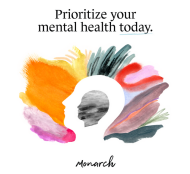Are the January Blues Real?
Are the January Blues Real?
A new year can feel hopeful, full of potential, and inspire us to refocus on the impact we want to make in our personal lives and community. It can also highlight challenges and obstacles.
You may be surprised to learn that January is the worst month of the year for depression and anxiety. Yes, the “January blues” are real.
The holidays tend to be a time where we have an abundance of expectations and needs. Post-holiday, we slow down and then have more opportunity to be aware of thoughts and feelings that have arisen over the past weeks.
Processing these can be hard and something we’d like to avoid.
Another contributor to mental health challenges in January is family dysfunction or unresolved childhood trauma, highlighted by the time of year or holidays.
So what can we do to function at our best?
Be Mindful. Pay attention to your moods. Track your thoughts and remember just because you have a thought doesn’t mean you believe it. Notice your expectations. Check in with yourself throughout the day.
Work to identify your feelings and then give yourself permission to acknowledge them. “I notice I am feeling lonely.” While it may seem that “just” acknowledging your emotions isn’t much, the reality is that ignoring them can lead to an increase in anxiety, depression, physical symptoms, and even panic attacks.
Do a feelings versus fact check. Recognize you can have strong, negative feelings AND you can be a good person/be okay. We can get absorbed by our strong emotions and the accompanying physical sensations to the point that our current experience seems like a full representation of what is real. This often leads to a disconnect from what’s true, or what we really believe about ourselves, our situation, and/or others.
Find ways to express and process your feelings such as journaling or a creative outlet;  exercising or yoga; do some focused tapping (the Emotional Freedom Technique/EFT).
exercising or yoga; do some focused tapping (the Emotional Freedom Technique/EFT).
Address your trauma. Trauma affects the brain’s ability to appropriately respond to situations, increasing hypervigilence. A trauma informed counselor can help guide you through resolving the trauma and moving forward toward healing.
Expect challenges rather than focusing on having everything be smooth and controlled. Then trust that you’ll be okay to handle whatever comes up.
Focus on what you can control right now. You may not be able to control the circumstance, but you can attempt to be intentional about your responses to thoughts and feelings.
Reach out for support. Mental health challenges, such as depression and anxiety, often lead us to withdraw. Research shows that social connection can provide a significant amount of support to help us cope and heal. Connect with people you trust and find a counselor to work with, if needed.
to withdraw. Research shows that social connection can provide a significant amount of support to help us cope and heal. Connect with people you trust and find a counselor to work with, if needed.
Kristine Proctor is a licensed clinical social worker providing counseling, both in person and via telehealth, to individual adults in Florida, Michigan, Maine, and around the globe. To contact Kristine click here.
